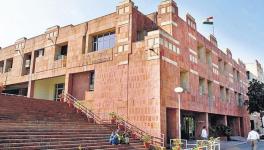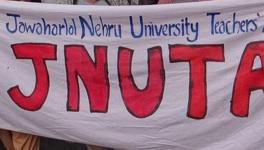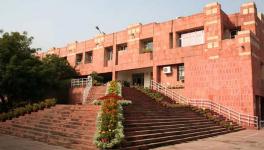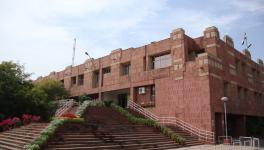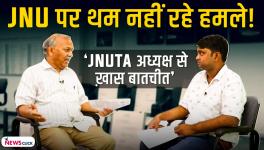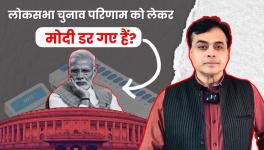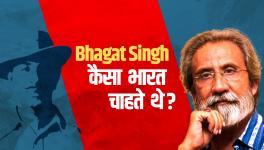What we Learned from C.P. Bhambri
Image Source; The Indian Express
Celebrated social scientist and professor, C.P. Bhambri, who passed away on November 8, had a distinguished record as an academic. He taught generations of students in several universities, including Jawaharlal Nehru University (JNU), which he joined in the early 1970s; it remained central to his life and work till his sad demise.
He, along with professor Rasheeduddin Khan and Professor K. Seshadri, founded the Centre for Political Studies (CPS) in JNU and became the force behind its progress. He famously said that the CPS was founded to provide a different approach to political science, one that did not follow the behavioural approach or the structural-functional approach to explain power politics and political persuasion. Therefore, he contested the ideas of professor Rajni Kothari who founded the Centre for Study of Developing Societies.
Bhambri was well known in the academic world for the depth of his scholarship and academic excellence. I was familiar with his work while pursuing a political science honours course in a small college in Odisha in the late 70s. His textbook on public administration was recommended by our college teachers as a guide to understanding the theory and practice of public administration. In fact, the book aided and enriched a generation of students who studied political science at the undergraduate level and for various competitive examinations. So, when I joined JNU for an MA in political science and came to know that Professor Bhambri was one of the faculty members in CPS, I could not believe I would be taught by someone who I read as a student.
In JNU, he taught us ‘Politics in India’, a subject in the last semester of my masters course. I can never forget his first lecture in which he outlined the two methods used to study social science – Marxist and Non-Marxist. With great clarity, he explained that while in the Marxist method the state is seen as an instrument of the ruling class while in the other, it is held to be an institution to arbitrate diverse and conflicting interests for the purpose of sustaining the system. Frankly, my understanding of the two approaches to study the social sciences improved with the insights from that very first lecture.
He also said that the non-Marxist stream was best represented by Max Weber and all those who followed him. He added that while centrality of human labour enabled Marxists to understand history and explain the material dimensions of society, the Weberians posited that Indians were too contemplative and meditative, and had mystic dimensions to their outlook in life. If Indians were so contemplative and meditative, how did they produce such fine textiles and other material objects which the world marveled at, he asked. At that age, I was impressed by the short and succinct analysis; it continues to influence me even now in my limited engagement with research.
Incidentally, I did not do well in his paper on Indian politics but his explanation of the subject was quite persuasive; the conviction from his Marxian understanding of politics was strong. It was evident in one of his lectures. When fellow classmate Vanita Shastri – the current Dean of Social Sciences in Ashoka University – entered the classroom a few minutes after professor Bhambri had commenced his lecture, he afforded himself an uncomfortable pause and gravely said: ‘Once I enter the class nobody should enter’. When she apologised saying she was running late due to another class, professor Bhambri remarked cryptically: ‘I am equally class conscious’. In a way, this summed up his unwavering commitment to the Marxist approach.
That said, however, Prof Bhambri was not dogmatic and remained open to ideas and sustained the culture of interrogation, the characteristic of a well-cultivated academic. “I have fond memories of Prof. Bhambri, he was my MPhil thesis advisor. At first I was scared to have him in that role, him being a known Marxist and I, who was not one. But ideological issues never came up and his supervision of my thesis was smooth sailing. He was a good scholar and teacher. A role model for his work ethic,” Vanita wrote.
His open-minded approach was evident from one of his numerous articles on contemporary issues. One such insightful piece, ‘The Dalit Question as Answer to Hindutva’ published by The Tribune in February 2016 underlined a point. He observed: “The Dalit leadership understands that the complex Indian caste question is linked with history and political economy of India. The Dalit movement alone cannot deal with the challenge of ‘caste’ without forging alliances with other like-minded, progressive, secular, intellectual, social and political forces of the country.”
In another article, titled ‘Parivar’s wish: Education for Hinduisation’ published in the same newspaper on March 11, 2016, he wrote about universities where the free atmosphere of debate and dissent give rise to blooming flowers. It yet again underscored his open-mindedness even as he remained wedded to his own worldview anchored in Marxism.
Much later, after I left JNU and was serving then President K.R. Narayanan, he once called on me. The President always asked for some material to write articles or for other academic purposes. It was indeed delightful to see professor Bhambri so passionately pursuing academics, even at that advanced stage of his life.
When JNU faced relentless attacks from Modi regime in 2016 and some students faced sedition charges, he emerged as one of its staunch defenders. Observing with deep anguish, he had written (in the aforementioned article) that “...JNU has been asked to defend its ‘nationalist’ credentials before the RSS-led Sangh Parivar and its affiliates who claim to be the champions of Hindu Rashtravad and patriotism.” He observed: “The Hindutva project of education as defined and interpreted by the ideologues of the Sangh Parivar cannot be pursued under the present university system which has been nurtured on the basis of values enshrined in the Constitution of democratic, liberal, secular, Republic of India.”
Noting that “conflicts on the campuses are nothing new”, he referred to the polarisation and anti-Vietnam war protests in the US and the revolt in Paris in 1970. He also recalled the words of philosopher Jean Paul Sartre, who, in the context of the campus revolt in Paris, had observed that campuses would play a transformative role. “Neither the US nor the French government declared the students, ‘anti-national’. Democracies grow only in a free atmosphere of debate and dissent but the BJP Government in power does not consider universities as centres of ideas, where a hundred different flowers bloom,” he observed.
His legacy will inspire generations to defend the idea of India and that of JNU. Long live Professor C.P. Bhambri.
The writer was OSD and Press Secretary to former President of India, K.R. Narayanan. The views are personal.
Get the latest reports & analysis with people's perspective on Protests, movements & deep analytical videos, discussions of the current affairs in your Telegram app. Subscribe to NewsClick's Telegram channel & get Real-Time updates on stories, as they get published on our website.










